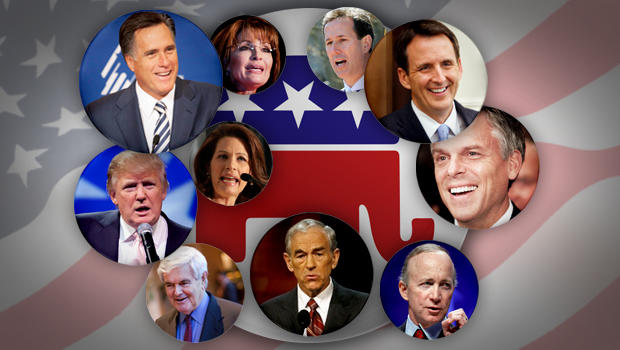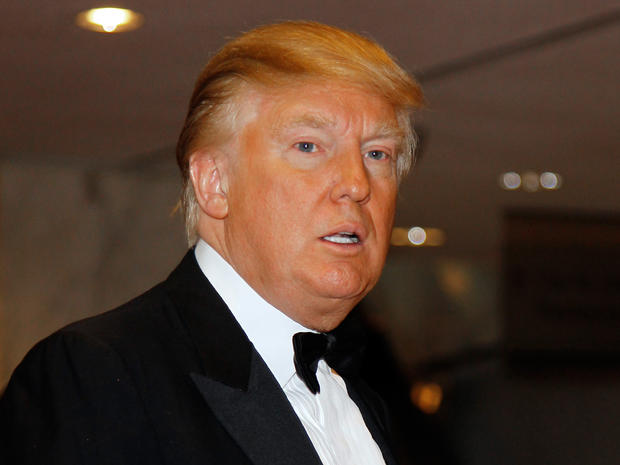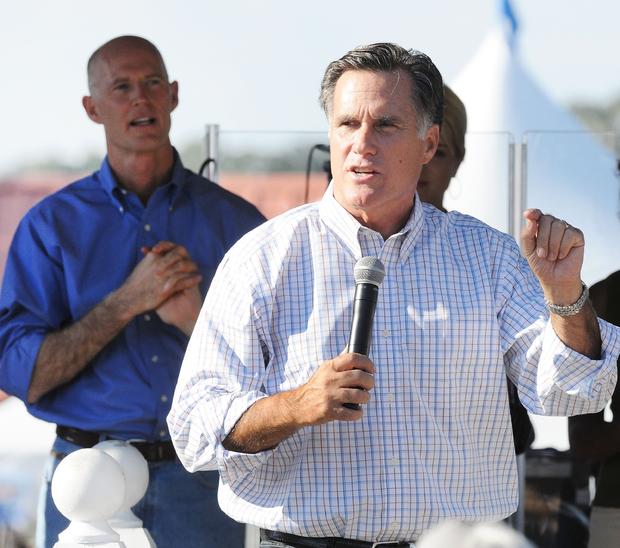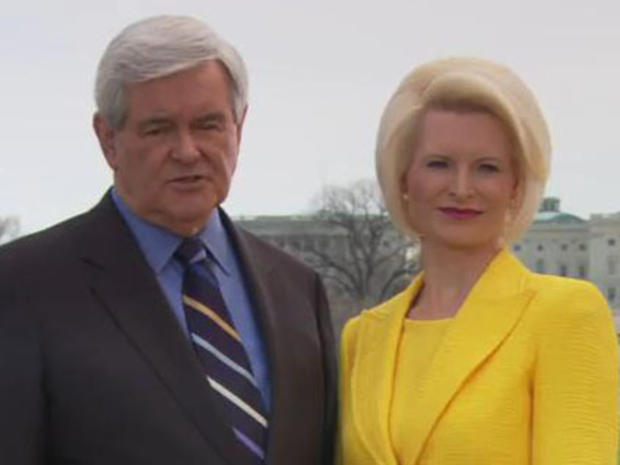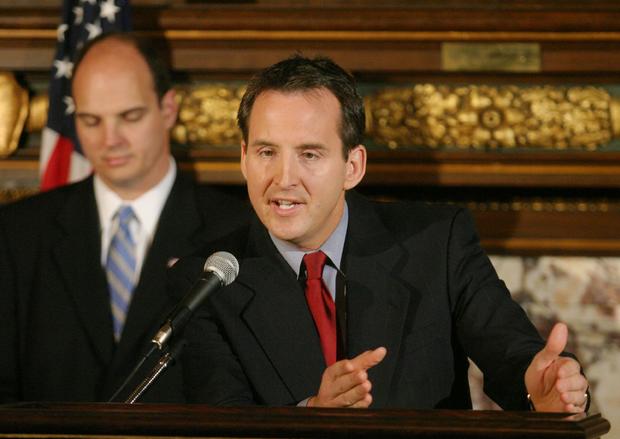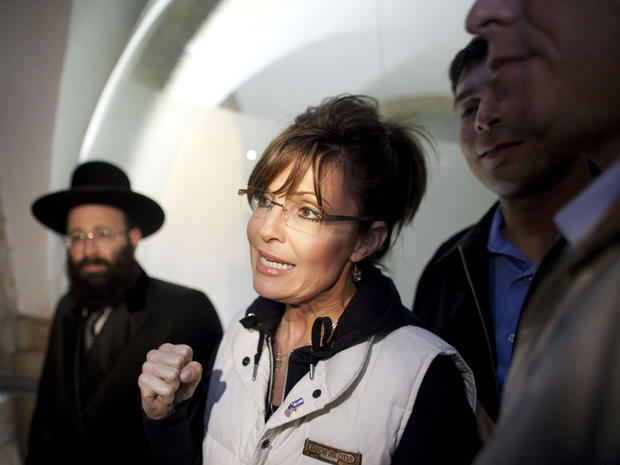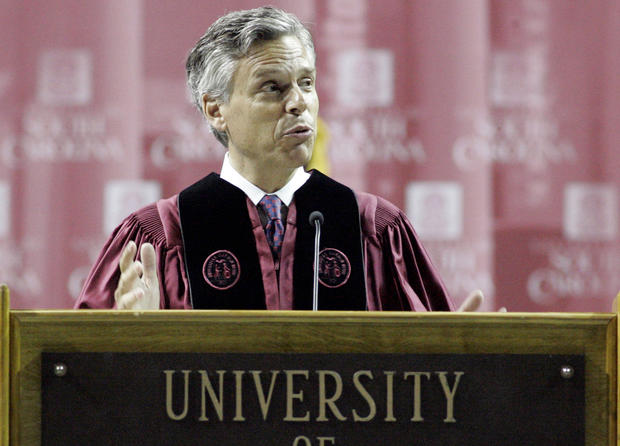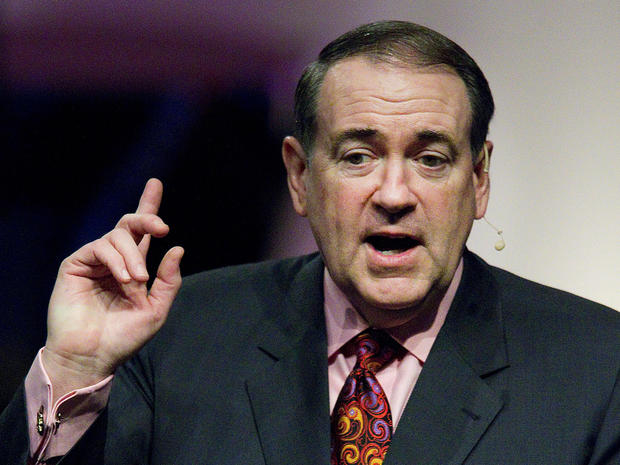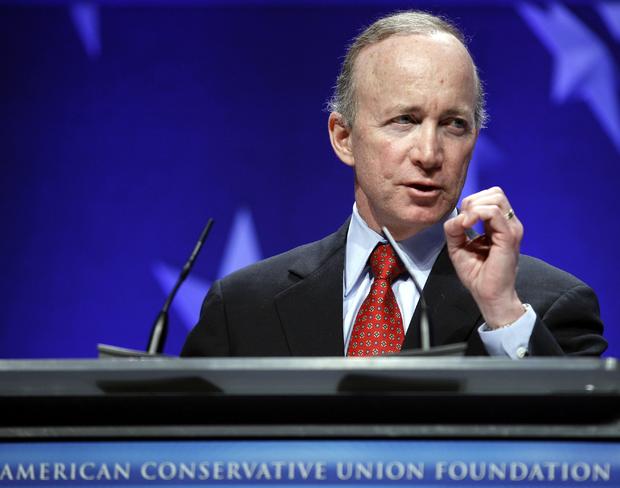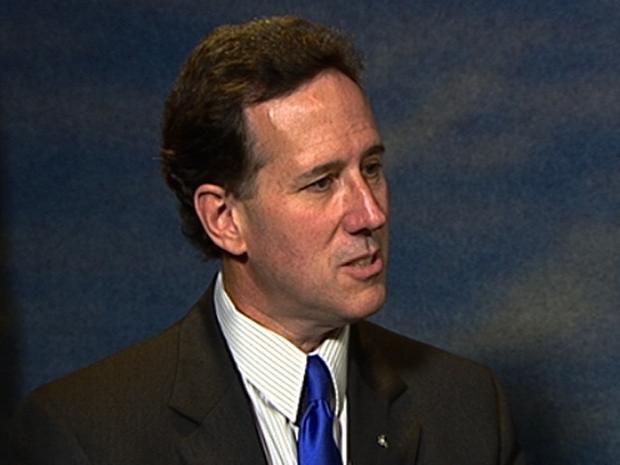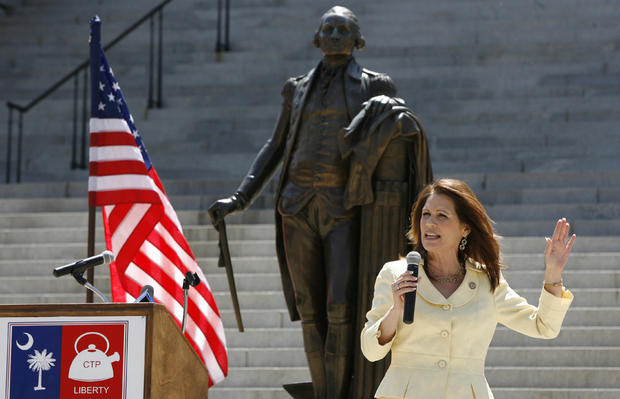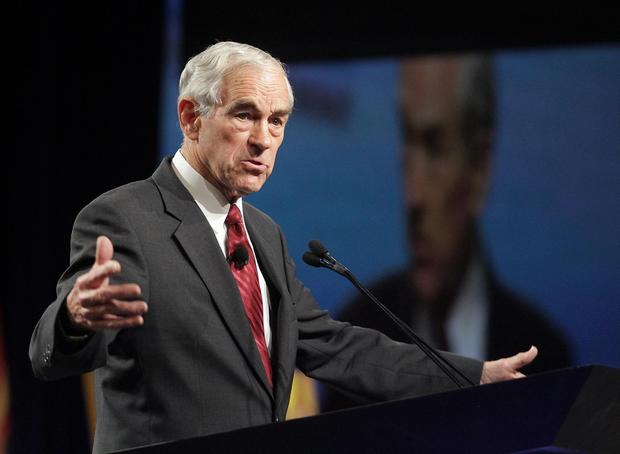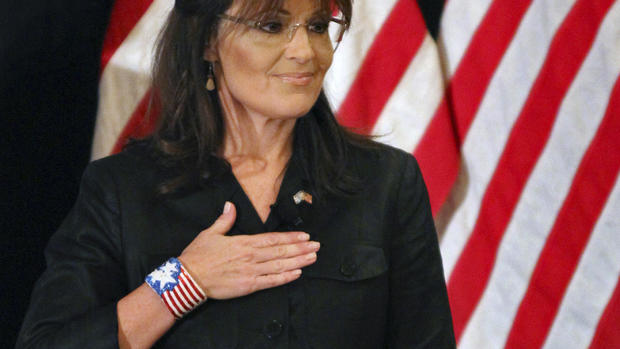What are the 2012 GOP candidates running from?
You almost never get to the verge of running for president without making a few moves you want to take back.
Indeed, many of the 2012 Republican presidential contenders have skeletons in the closet they would rather go unnoticed by the party faithful. How well they deal with them will help decide who emerges from the crowded, wide-open field to take President Obama on in the general election.
Below, a handy guide to the regrets of the major potential 2012 GOP presidential candidates - ranked from those with the most to forget to those who haven't changed a thing.
Donald Trump: It's hard to know where to start with The Donald. So let's just take a deep breath and dive in:
When he was considering running for president on the Reform Party ticket in 1999, Trump called himself "totally pro-choice." He now says he opposes abortion rights.
In his 2000 book, "The America We Deserve," Trump backed a one-time, 14.25 percent tax on Americans with a net worth of more than $10 million. Today, he says he wouldn't raise taxes to address the deficit, arguing that "this is a different time, a different world."
In the same book, Trump wrote that "we must have universal health care." He also wrote that "we need, as a nation, to reexamine the single-payer plan" -- and called for a health care system closer to Canada's.
Among the Democrats to whom Trump has donated are Rahm Emanuel, Charles Rangel, Harry Reid, Chuck Schumer, Ted Kennedy and John Kerry. While Trump has also donated to Republicans - like many businessmen, he has spread his money around - such donations are not easy to explain to a GOP primary electorate.
Gallery: Donald Trump in pictures
Top Trump aide Michael Cohen explained Trump's reversals to National Journal in February by saying that "[p]eople change their positions all the time, the way they change their wives."
"What you stood for 11 years ago you may not be standing for today," Cohen said. "Maybe it was the birth of his five children or his grandchild that changed his mind."
Mitt Romney: When Romney ran for president in the 2008 cycle, the former Massachusetts governor was criticized by many - including fellow Republicans like eventual nominee John McCain - for running away from his past, more moderate record on campaign finance reform, immigration and gun control, among other issues.
In 1994, Romney said he believed "abortion should be safe and legal in this country" and that the law allowing abortion should be upheld. Today, he says he opposes abortion rights.
Also in 1994, Romney told the Log Cabin Republicans that he favored "gays and lesbians being able to serve openly and honestly" in the military. By 2008, he opposed repeal of the "Don't Ask, Don't Tell" policy.
The biggest issue for Romney to address is health care reform. As Massachusetts governor, he signed into law a measure that looks an awful lot like President Obama's health care overhaul that is so disdained by Republicans. Romney has tried to differentiate between the two by stressing that the matter should be left to the states, but Republicans remain skeptical.
Gallery: Mitt Romney in pictures
On Thursday, he will address the issue in Michigan, where he is slated to "present his plan to repeal and replace Obamacare with reforms that lower costs and empower states to craft their own health care solutions."
Quipped McCain in one 2007 debate, after being criticized by Romney: "I haven't changed my position on even number years or have changed because of the different offices that I might be running for."
Newt Gingrich: The former House Speaker has something of an insider problem: It's not good for a candidate to be seen as a product of Washington - particularly these days - and Gingrich may need to convince skeptical voters that he doesn't represent the establishment past. He has also been criticized for appearing to flip-flop on how best to handle Libya.
But perhaps the larger issue for Gingrich to deal with from his pre-campaign days is his personal history. Gingrich has been married three times, most recently to Callista Gingrich, with whom he had an extramarital affair when she was in her twenties. He is now trying to present himself as a religious family man - the Catholic-convert apologized for his infidelity on evangelical leader James Dobson's radio show - in what appears to be an effort to overcome the skepticism of cultural conservatives.
Gallery: Newt Gingrich in pictures
In March, Gingrich raised eyebrows when he suggested that his past indiscretions were driven in part by "how passionately I felt about this country."
"And what I can tell you is that when I did things that were wrong, I wasn't trapped in situation ethics, I was doing things that were wrong, and yet, I was doing it," he said. "I found that I felt compelled to seek God's forgiveness." He added that "our Judeo-Christian civilization is under attack" from "secular, atheist elitism."
Tim Pawlenty: The former Minnesota governor has carefully laid the groundwork for this 2012 campaign, but there is one issue that will likely continue to dog him: His onetime support for a so-called "cap and trade" system to reduce greenhouse gas emissions.
In 2008, Pawlenty recorded a radio ad in which he urged Congress to "get moving" to "cap greenhouse gas pollution now." In 2006 and 2007, he was one of the leading Republicans voices on addressing climate change.
Pawlenty now casts that position as a mistake. At the GOP presidential debate last week, he said after studying the issue, he concluded that cap and trade was a "bad idea."
"We all, everybody here and anybody else who is going to running for president or considering running for president, if you've got an executive position and you've been in the battle, you're going to have some battle scars, or you're going to have a few clunkers in your record," he said. "We all do, and that's one of mine. I just admit it. I don't try to duck it, bob it, weave it, try to explain it away."
Gallery: Tim Pawlenty in pictures
Interestingly, Gingrich has come under similar criticism for once appearing in an ad with Democrat Nancy Pelosi to say that "we do agree our country must take action to address climate change." But Gingrich isn't apologizing. "My point is conservatives ought to be prepared to stand on the same stage and offer a conservative solution," he said last May.
Sarah Palin: On most of her policy positions, Palin has held firm. But the fact that she resigned as Alaska governor two and a half years into her term rubs some Republicans the wrong way - particularly since she used her time out of office in part to film a reality television show.
"I have a high regard for Sarah Palin, but I will say I've been disappointed since she resigned as governor," onetime Palin booster Bill Kristol, editor of the conservative Weekly Standard, said in March. "I thought she had a real chance to take the lead on a few policy issues, do a little more in terms of framing the policy agenda. I don't think she's done that."
Gallery: Sarah Palin in pictures
That's not Palin's only problem related to her past. The surprise 2008 vice presidential nominee's rhetoric during the campaign was immediately polarizing. She would likely have to at least somewhat overcome her image as a confrontational figure to have success in a general election campaign.
Jon Huntsman: The problem issue for the former moderate Utah governor is his decision to accept an offer to serve in the Obama administration, as ambassador to China. And doesn't he know it: Mr. Obama, in reference to Huntsman's plans to challenge him, has jokedthat "I'm sure that him having worked so well with me will be a great asset in any Republican primary." It doesn't help that Huntsman was found to have written a letter to the president in 2009 in which he called the president a "remarkable leader" - with the word "remarkable" underlined.
In his first speech since his return from China, Huntsman cast his decision to accept the ambassadorship as one of serving the country. "Work to keep America great. Serve her, if asked," he told graduates at the University of South Carolina. "I was, by a president of a different political party. But in the end, while we might not all be of one party, we are all part of one nation, a nation that needs your generational gift of energy and confidence."
Mike Huckabee: The former Arkansas governor and 2008 presidential candidate has come under fire for his onetime support for giving illegal immigrants "a pathway to citizenship." Huckabee also supported efforts that would have provided scholarships to undocumented immigrants. The positions prompted Romney to paint Huckabee as soft on illegal immigration in the 2008 presidential campaign.
In 2007, Huckabee said he supported a mandatory cap-and-trade program, a position he now denies holding. He wrote in 2009 that cap and trade would have a "catastrophic" effect on the economy.
And Huckabee has been haunted by his alleged role in the release of convicted rapist Wayne DuMond, who was convicted of a new rape and murder after his release.
Mitch Daniels: The Indiana governor is seen by many Republicans as their best hope for defeating President Obama in a general election. But if Daniels gets into the race, his record as Office of Management and Budget director under President Bush will come under greater scrutiny.
Daniels, who was nicknamed "The Blade" for his budget-cutting impulse under Mr. Bush, "carried water, as director of the Office of Management and Budget, for some of the Bush administration's more egregious budgets," according to conservative columnist Ross Douthat. And while Daniels was at OMB the Clinton-era budget surplus became a budget deficit.*
Rick Santorum: The former Pennsylvania senator is an unapologetic social conservative, and he has not modulated his positions as he has embarked on a long-shot bid for the 2012 nomination. But he has one minor skeleton in his closet - his past support for Republican-turned-Democrat Arlen Specter.
Pressed at a conservative conference last year on his decision to back Specter over the more conservative Pat Toomey in the 2004 Pennsylvania Senate primary, Santorum said he made a hard decision to support Specter, who was seen as the more electable option, because of his opposition to abortion.
Santorum said he made the decision because Specter had agreed to support then-President George W. Bush's Supreme Court nominees. (Specter denies this.) Santorum decided that it was worth backing Specter, he said, in order to help ensure a conservative Supreme Court that could overturn abortion rights.
"You questioned my judgment, and you have every right to do so," he said. "But please don't question my intention to do what's right for those little babies."
Santorum also has a Google problem. His position on gay rights prompted liberal gay rights activist and columnist Dan Savage to redefine "santorum" as an explicit aspect of gay sex, and if you Google his last name the result is the first to show up.
Gallery: Rick Santorum in pictures
Michele Bachmann: Bachmann, a social and fiscal conservative, has remained solidly on the right side of the political spectrum as she has risen to national prominence.
While she certainly has something of a polarization problem, it's hardly something she could be said to be running away from.
Ron Paul: Perhaps even more ideologically consistent than Bachmann is Ron Paul, the libertarian-leaning Texas congressman who makes no apologies for positions that are outside the Republican orthodoxy. Consider: Paul told a GOP presidential debate audience last week that heroin and prostitution should be legal on a federal level, since the federal government should not be telling people how to live.
That sort of consistency may not win Paul the nomination, but it certainly earns him credibility in claiming that, when it comes to his politics, he has no regrets.
*A portion of this post concerning Daniels' projections for the cost of the Iraq war was removed to reflect the fact that Daniels' projection was for a six-month period, not the entire war.
